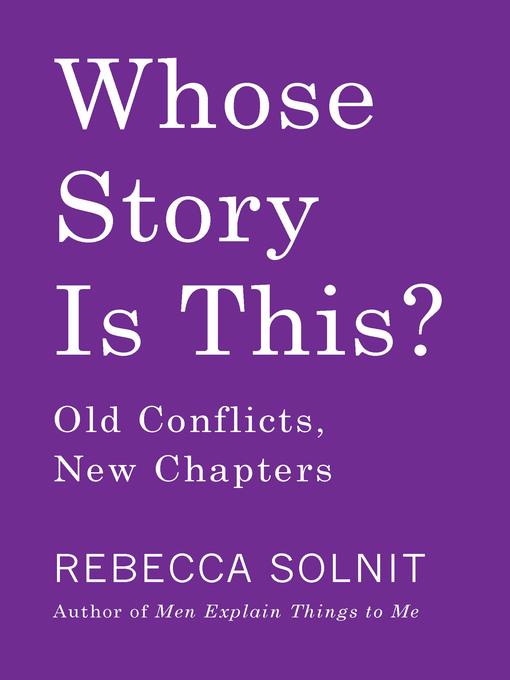
Whose Story Is This?
Old Conflicts, New Chapters
- اطلاعات
- نقد و بررسی
- دیدگاه کاربران
نقد و بررسی

July 1, 2019
Solnit (Hope in the Dark) highlights gains in the reframing of the American narrative in her incisive latest essay collection. The new narrative, she argues, is progressive and wider in scope, and makes room for the voices of women and people of color. In a moving open letter to Christine Blasey Ford, who testified to the Senate during Brett Kavanaugh’s Supreme Court confirmation hearings that Kavanaugh had sexually assaulted her while the two were in high school, Solnit notes the cultural and legislative changes that came about after Anita Hill’s testimony to demonstrate how the results of such an act of bravery “rippled outward in all directions.” In “The Problem with Sex Is Capitalism,” Solnit explores the entitlement that causes some misogynist men to become violent when denied access to women’s bodies; in “If I Were a Man” she enumerates the challenges of being a woman devoted to her career in a society that still expects women to sacrifice their own ambitions in order to be a caregiver and supporter of others. The collection’s standout, “A Hero Is a Disaster,” suggests a reevaluation of the American ideal of “rugged individualism” to reflect the fact that America’s (and the world’s) problems cannot be solved by single actors, but by “movements, coalitions, civil society” working in tandem. Solnit reasserts herself here as one of the most astute cultural critics in progressive discourse. This brief but trenchant collection will please her fans.

July 15, 2019
Clarion calls for social and political activism. Readers familiar with Solnit's most recent collections of essays, Call Them by Their Names, the winner of the 2018 Kirkus Prize for Nonfiction, will find more of the same here, laced with even more scathing and harsh assessments of our world today. In a series of sharp pieces, the author dissects a variety of timely topics, especially the sexual harassment and discrimination of women and the #MeToo movement as well as Native American rights, the anti-gun movement, white nationalism, Black Lives Matter, and climate change. Solnit argues that we live in a transformative time: "You can see change itself happening, if you watch carefully and keep track of what was versus is." She wants to build "new cathedrals for new constituencies." The names may have changed, but for Solnit, the stories remain the same. After recalling being sexually harassed by a cook when she was a busgirl, she goes on to discuss Harvey Weinstein and how some men in power can go to "extraordinary lengths to make somebodies into nobodies," noting "that truth, like women, can be bullied into behaving." In "Voter Suppression Begins at Home," Solnit recounts personally observing how husbands can "bully and silence and control their wives," even with mail-in ballots. She takes on Brett Kavanaugh and Jian Ghomeshi, formerly with CBC, over the "long, brutal tradition of asserting that men are credible but women are not." She praises Christine Blasey Ford as a "welcome earthquake" for speaking out at the Kavanaugh hearing. The author also praises Alexandria Ocasio-Cortez for her Green New Deal and those who helped remove Confederate statues around the country--though she bemoans the fact "that there are only five statues of named women in New York City." Donald Trump, that "dirtbag dragon," is often held up for scorn. Despite some repetition, Solnit's passionate, shrewd, and hopeful critiques are a road map for positive change. Keep these collections coming.
COPYRIGHT(2019) Kirkus Reviews, ALL RIGHTS RESERVED.

September 1, 2019
Solnit's (The Mother of All Questions, 2017) latest collection reminds readers that, looking out of every window, we must also consider the frame. In addition to the title question, essays ask: Who has power? Who is somebody? Who is credible? Who is afforded a comfortable life?, and many other questions aimed at leveling the uneven surface of the world in which we live. In many instances, Solnit looks back on her decades spent writing about the web of inequalities spun by white male-dominated society in order to honor the long, slow, mostly quiet processes that preceded massive change. In one of several essays concerning #MeToo, she writes, Something happens suddenly, and that's mistaken for something happening out of the blue. Considering people, concepts, and art, Solnit's engaging political discourse topples the systems and structures we take for granted and assures us that all progress stems from better knowing and working with one another: This country has room for everybody who believes that there's room for everybody. (Reprinted with permission of Booklist, copyright 2019, American Library Association.)




دیدگاه کاربران